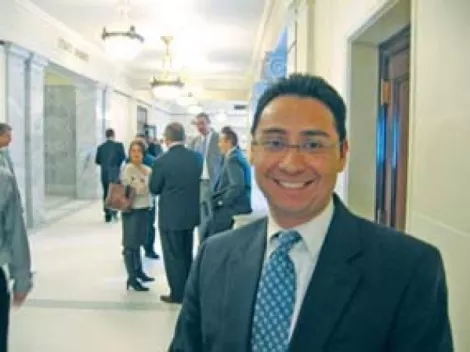
While the Immigration Interim Committee is studying SB 81, another bill has emerged from the panel. House Bill 64 proposes the creation of a multi-agency “strike force” to combat major crime associated with undocumented immigrants. Some see the strike-force bill as a more cost-efficient alternative to the sweeping omnibus bill, which carries a $1.8 million price tag.
HB 64 passed out of the Immigration Interim Committee just before the 2009 Legislature convened. Rep. Brad Dee, R-Ogden, describes his bill as one that would link city, state and ICE personnel and resources to aggressively investigate major crimes associated with undocumented immigration.
“If we can get a handle on felony crimes—drugs, prostitution, trafficking—then we get a hold of the biggest part of the problem,” Dee says.
Dee envisions the strike force as operating out of the Utah Attorney General’s Office where several task forces—including drug and gang groups—already work closely with federal officials. The bill would also take effect July 1.
nWhile the strike force would benefit from the resources of existing gang and drug taskforces, Dee doesn’t like that word. “I don’t like to call it a task force,” Dee says, “because it has more to do with direct interdiction on the ground.” The strike force would investigate crimes ranging from human and narcotic trafficking in southern Utah to drug and gang activity in the urban north.
Dee says the strike force in theory is modeled after an Arizona program called the Illegal Immigration Prevention and Apprehension Co-op Teams (IIMPACT). Funded along with several other programs aimed at undocumented crime, IIMPACT is part of a $10 million package the Arizona Legislature passed in 2008. The IIMPACT team is made up of members of the Arizona Department of Public Safety, ICE and the Phoenix Police Department.
Dee believes his bill offers the most promise to Utahns concerned about illegal immigration. But questions remain. How, for instance, will the Legislature allocate funds for the reforms? The original language of HB 64 had a $1 million fiscal note attached, but Dee says he is exploring other options hopefully to bring the cost down even further.
Another concern is if the level of crime committed by illegal immigrants in Utah justifies the creation of the strike force. While not commenting on any specific legislation, U.S. Attorney for Utah Brett Tolman notes that tracking undocumented immigrant crime is difficult. “It’s very hard to document what levels of crime exist in such a narrow cross-section of our population,” Tolman says.
Still, Tolman concedes that roughly 25 percent of his office’s caseload involves trying undocumented immigrants who have committed felonies in the United States and been deported, then re-entered the country illegally. But these individuals are generally not violent offenders, he says. Tolman also believes the idea that law enforcement is not doing enough may be an overreaction. “There is a lot of aggressive prosecution (of the undocumented) going on in Utah, especially for being an interior state compared to a border state.”
Sen. Ross Romero, D-Salt Lake City, sits on the Immigration Interim Committee. He doesn’t recall hearing much evidence during hearings regarding immigrant crime in Utah, but he supports the bill. “The question is, do we need this? I asked that question in committee and the understanding I had is that this will allow state, local and federal [law enforcement] to be in better communication and working collaboratively. And if that is the case, I understand the bill, and I think it prioritizes more appropriately our important state resources.”
Dee disagrees that there is a dearth of evidence of undocumented crime, citing a number of homicides in St. George where victims and offenders were undocumented, as well as a study identifying a Mexican cartel’s meth trade in Utah. But he and Romero both believe that the strike force could temper some of SB 81’s blanket authority.
“I’m not after the fry cook, I’m not after the maid that works at a hotel in Park City,” Dee says. “I’m not trying to put in the program that would deputize all police officers on the street [with ICE duties], I’m not interested in that. What I’m interested in is felony crimes.” Dee agrees with many law enforcement officials that cross-deputizing of police will discourage cooperation from sources inside immigrant communities.
Salt Lake City Police Chief Chris Burbank thinks the strike force has merit. While Burbank is unfamiliar with the strike-force bill, he says he can see how it would be more effective than SB81. “A strike force that would look specifically at criminal violations of law, I’m not opposed to. That’s perfectly legitimate,” Burbank says.
Dee, unlike fellow committee member Romero, approves of the employer verification aspect of SB 81. But the fact that they agree on the strike force as a more precise crime deterrent than SB 81 could be grounds for some reform to the controversial omnibus bill.
“With a lower fiscal note that goes after the hardcore criminal elements as opposed to the hardworking community [members]—which may be undocumented,” Romero says. “I think [HB 64] is a better use of our money, and a fairer use of our dollars that can be embraced by the community on a much broader scale.” tttt